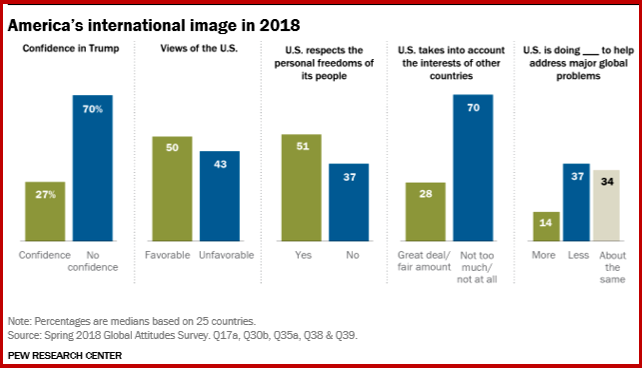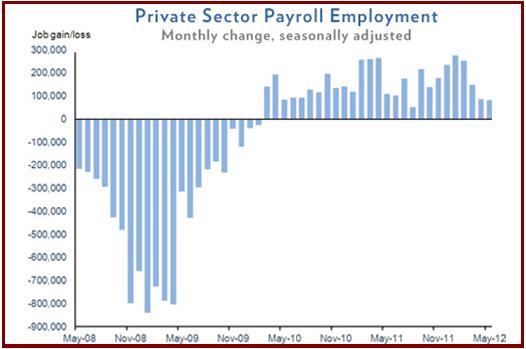 As the second anniversary of U.S. President Donald Trump’s election approaches, a new 25-nation Pew Research Center survey finds that Trump’s international image remains poor, while ratings for the United States are much lower than during Barack Obama’s presidency. (Trump’s international ratings remain low, especially among key allies)
As the second anniversary of U.S. President Donald Trump’s election approaches, a new 25-nation Pew Research Center survey finds that Trump’s international image remains poor, while ratings for the United States are much lower than during Barack Obama’s presidency. (Trump’s international ratings remain low, especially among key allies)

It is time to put the name “somebody else” on all ballots, which if somebody else wins starts another election with the other previously listed candidates disqualified from running again.
In advanced and emerging economies alike, people generally agree that growing trade and business ties with other nations are good for their country, at least in theory. But far fewer are convinced that increased trade results in more jobs, higher wages or lower prices at home – all benefits frequently touted by economists and proponents of international trade. (Americans, like many in other advanced economies, not convinced of trade’s benefits)
“September and October of 2008 were the worst financial crisis in global history, including the Great Depression,” former chairman of the U.S. Federal Reserve Ben Bernanke has observed. The bottom fell out of the economies in many nations, ushering in widespread malaise. A decade later, economies have gradually recovered and the public mood has rebounded, especially in some of the hardest-hit advanced economies, according to a spring 2018 Pew Research Center survey of 27 countries around the globe. (A decade after the financial crisis, economic confidence rebounds in many countries)
Across the globe, new technologies are transforming the nature of work. Advances in robotics and artificial intelligence are displacing jobs in manufacturing and, increasingly, in the service sector. And while automation may boost productivity and overall economic growth, there is a recognition that it will also disrupt the workplace, with repercussions for workers, employers, education systems and governments. (In advanced and emerging economies alike, worries about job automation)
Populist parties and movements have disrupted the political landscape in Western Europe, from the U.K.’s Brexit vote to the rise of a populist governing coalition in Italy. To learn more about what traditional and populist party support looks like in Western Europe, explore our new interactive feature. Select a country to explore the share of people who are in each political group, where traditional party supporters fall and how these groups feel about key political parties. (Interactive: How traditional and populist party support differs across Western Europe)
The general election in Sweden extended two trends that are now prominent across Western Europe: the rise of right-wing populist parties and the decline of center-left parties. The far-right Sweden Democrats entered parliament for the first time in 2010, winning 6% of the vote. This month, they finished in third place with 18% of the vote. And while the center-left Social Democrats finished ahead of the Sweden Democrats, they registered their worst electoral performance in more than 100 years. (Swedish election highlights decline of center-left parties across Western Europe)
Three years after a record 1.3 million migrants sought asylum in Europe, most people in several European countries say they support taking in refugees who are fleeing violence and war, according to a Pew Research Center survey. However, most people in these countries disapprove of the way the European Union has dealt with the refugee issue. (A majority of Europeans favor taking in refugees, but most disapprove of EU’s handling of the issue)

About Ken Zino
Ken Zino, editor and publisher of AutoInformed, is a versatile auto industry participant with global experience spanning decades in print and broadcast journalism, as well as social media. He has automobile testing, marketing, public relations and communications experience. He is past president of The International Motor Press Assn, the Detroit Press Club, founding member and first President of the Automotive Press Assn. He is a member of APA, IMPA and the Midwest Automotive Press Assn.
He also brings an historical perspective while citing their contemporary relevance of the work of legendary auto writers such as Ken Purdy, Jim Dunne or Jerry Flint, or writers such as Red Smith, Mark Twain, Thomas Jefferson – all to bring perspective to a chaotic automotive universe.
Above all, decades after he first drove a car, Zino still revels in the sound of the exhaust as the throttle is blipped during a downshift and the driver’s rush that occurs when the entry, apex and exit points of a turn are smoothly and swiftly crossed. It’s the beginning of a perfect lap.
AutoInformed has an editorial philosophy that loves transportation machines of all kinds while promoting critical thinking about the future use of cars and trucks.
Zino builds AutoInformed from his background in automotive journalism starting at Hearst Publishing in New York City on Motor and MotorTech Magazines and car testing where he reviewed hundreds of vehicles in his decade-long stint as the Detroit Bureau Chief of Road & Track magazine. Zino has also worked in Europe, and Asia – now the largest automotive market in the world with China at its center.


Trump’s International Ratings Remain Laughably Low
It is time to put the name “somebody else” on all ballots, which if somebody else wins starts another election with the other previously listed candidates disqualified from running again.
In advanced and emerging economies alike, people generally agree that growing trade and business ties with other nations are good for their country, at least in theory. But far fewer are convinced that increased trade results in more jobs, higher wages or lower prices at home – all benefits frequently touted by economists and proponents of international trade. (Americans, like many in other advanced economies, not convinced of trade’s benefits)
“September and October of 2008 were the worst financial crisis in global history, including the Great Depression,” former chairman of the U.S. Federal Reserve Ben Bernanke has observed. The bottom fell out of the economies in many nations, ushering in widespread malaise. A decade later, economies have gradually recovered and the public mood has rebounded, especially in some of the hardest-hit advanced economies, according to a spring 2018 Pew Research Center survey of 27 countries around the globe. (A decade after the financial crisis, economic confidence rebounds in many countries)
Across the globe, new technologies are transforming the nature of work. Advances in robotics and artificial intelligence are displacing jobs in manufacturing and, increasingly, in the service sector. And while automation may boost productivity and overall economic growth, there is a recognition that it will also disrupt the workplace, with repercussions for workers, employers, education systems and governments. (In advanced and emerging economies alike, worries about job automation)
Populist parties and movements have disrupted the political landscape in Western Europe, from the U.K.’s Brexit vote to the rise of a populist governing coalition in Italy. To learn more about what traditional and populist party support looks like in Western Europe, explore our new interactive feature. Select a country to explore the share of people who are in each political group, where traditional party supporters fall and how these groups feel about key political parties. (Interactive: How traditional and populist party support differs across Western Europe)
The general election in Sweden extended two trends that are now prominent across Western Europe: the rise of right-wing populist parties and the decline of center-left parties. The far-right Sweden Democrats entered parliament for the first time in 2010, winning 6% of the vote. This month, they finished in third place with 18% of the vote. And while the center-left Social Democrats finished ahead of the Sweden Democrats, they registered their worst electoral performance in more than 100 years. (Swedish election highlights decline of center-left parties across Western Europe)
Three years after a record 1.3 million migrants sought asylum in Europe, most people in several European countries say they support taking in refugees who are fleeing violence and war, according to a Pew Research Center survey. However, most people in these countries disapprove of the way the European Union has dealt with the refugee issue. (A majority of Europeans favor taking in refugees, but most disapprove of EU’s handling of the issue)
About Ken Zino
Ken Zino, editor and publisher of AutoInformed, is a versatile auto industry participant with global experience spanning decades in print and broadcast journalism, as well as social media. He has automobile testing, marketing, public relations and communications experience. He is past president of The International Motor Press Assn, the Detroit Press Club, founding member and first President of the Automotive Press Assn. He is a member of APA, IMPA and the Midwest Automotive Press Assn. He also brings an historical perspective while citing their contemporary relevance of the work of legendary auto writers such as Ken Purdy, Jim Dunne or Jerry Flint, or writers such as Red Smith, Mark Twain, Thomas Jefferson – all to bring perspective to a chaotic automotive universe. Above all, decades after he first drove a car, Zino still revels in the sound of the exhaust as the throttle is blipped during a downshift and the driver’s rush that occurs when the entry, apex and exit points of a turn are smoothly and swiftly crossed. It’s the beginning of a perfect lap. AutoInformed has an editorial philosophy that loves transportation machines of all kinds while promoting critical thinking about the future use of cars and trucks. Zino builds AutoInformed from his background in automotive journalism starting at Hearst Publishing in New York City on Motor and MotorTech Magazines and car testing where he reviewed hundreds of vehicles in his decade-long stint as the Detroit Bureau Chief of Road & Track magazine. Zino has also worked in Europe, and Asia – now the largest automotive market in the world with China at its center.